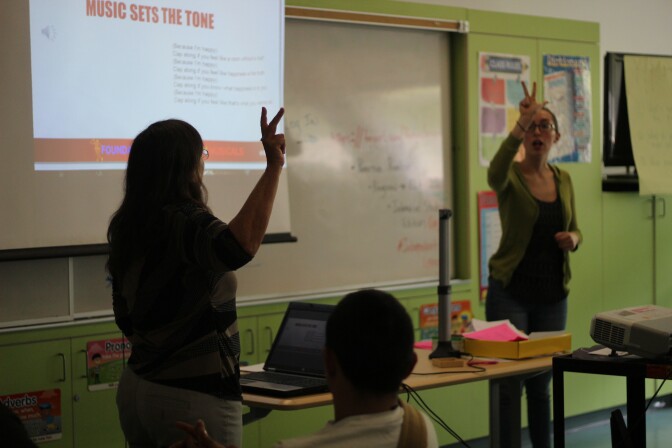This story is free to read because readers choose to support LAist. If you find value in independent local reporting, make a donation to power our newsroom today.
This archival content was originally written for and published on KPCC.org. Keep in mind that links and images may no longer work — and references may be outdated.
The next 'Hamilton'? High school students write musicals about history
Usually, when high school students are interested in theater, they have to perform works written by other people – but the eleventh graders at West Adams Preparatory High's School of the Arts had the opportunity to write shows themselves.
Over the past semester, the students met with teaching artists from the Foundation for New American Musicals, to turn what they were learning about American history into 10 minute shows, complete with scripts and songs.
Deirdre Marlowe, a teaching artist with the Foundation for New American Musicals, said she believes pairing musical theater and history just makes sense.
"This is a way of providing historical context in a way that's fun, and creative, and is team oriented," she said. "You learn to care about outcomes and you learn to root for outcomes."
The recently popularity of song-filled movies like "La La Land" and stage shows like Broadway's "Hamilton" among young people also helped keep the students engaged.

Eleventh-grader America Camacho worked with a team to write a musical about the Roaring Twenties. Their piece was chosen as the finale of a showcase, where professional actors performed the students' work. She said the project was very different from a traditional history class essay.
"We kind of have to be the character in a way," she explained. "We have to kind of think, 'What would this character do?'"
And to do that, they had to do deep research into their assigned time period. One of Camacho's classmates, Denisse Berganza, said that immersion taught the group more about the 1920's.
"We did learn a lot of things that happened, like how it was a life of luxury, and how there was a lot of mafia and gangs, and the prohibition laws and women's rights," Berganza explained.
Another group wrote about the Jim Crow laws in the American South. Here's an excerpt from their original song, "Back of the Bus":
I just want equality
We just want a chance to be
We want to be free!
On our way home
There will be no fuss
We'll just take our seats
Anywhere on the bus
"When they started realizing that these in their mind these old historical dusty characters could actually be singing music that we like ... their eyes really light up," Bloom said.

Bloom said programs like this one are important to her because she and her fellow artists noticed that actors of color can have a hard time finding fulfilling roles in theater.
She said she believes reaching out to young people–particularly students of color–and giving them the tools to create stories that matter to them can be part of the solution.
"Go into these high schools and tell them, 'You can do it. We're gonna give you the tools to do it. You're going to feel how empowering and rewarding it is,'" Bloom said. "And, 'You're gonna wanna do it again.'"











